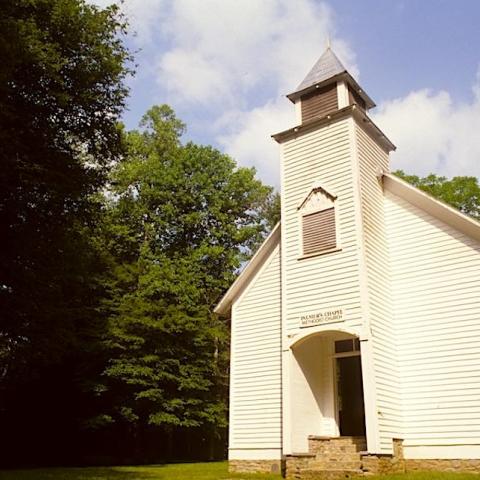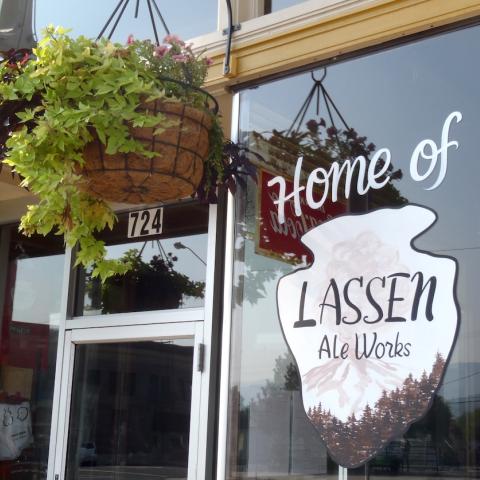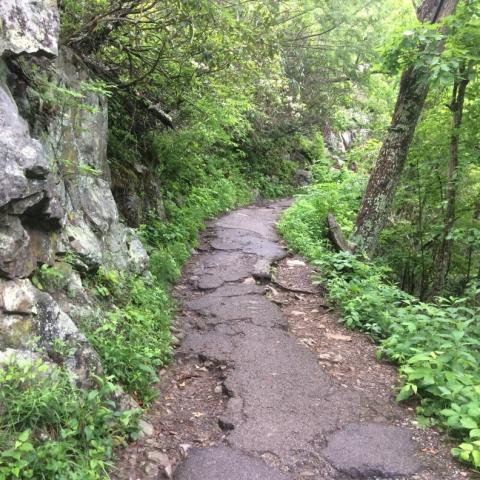
Can a 13-mile-long network of mountain bike trails really enhance your experience in Great Smoky Mountains National Park?/Harold Jerrell file
There is no need for 13 miles of mountain bike trails, with more asphalt and supporting infrastructure, to be cut into an undisturbed section of the Foothills Parkway at Great Smoky Mountains National Park.
At the end of the day, just how would the "experience of riding a narrow roller-coaster with a rhythm of twists and turns" enhance the visitor experience at this wondrous realm of nature? That question spins out of the park's scoping document concerning a "Wears Valley Mountain Bike Trail System." And it's not the only one.
Perhaps the only reason this proposal surfaced is because the area in question was eyed as a "transportation corridor" for the park back in 1944 when Congress told the National Park Service to acquire land on the Tennessee side of Great Smoky for a parkway "to provide an appropriate view of the Park from the Tennessee side of the park, and for other purposes…”
Land indeed was obtained for the envisioned Foothills Parkway, but not all of it was developed. Today, the portion known as Section D remains undeveloped, and its use as a mountain bike park is being considered by the park staff.
In advancing that proposal, the scoping document issued by the park the other day states that "(W)hile more than 800 miles of trails exist in the Park, less than 8 miles are open to biking and there are no by-design mountain biking trails."
However, according to the MTB Project, there are 70 miles of mountain bike routes in or next to the park. True, they might not be single-track miles (many if not all follow gravel roads), but do only single-track trails qualify as mountain bike trails? If so, the surrounding Pisgah, Nantahala, and Cherokee national forests have mountain bike trails.
The park's proposal begs the question of whether there is a need to build 13 miles of mountain bike trails in Great Smoky. Do mountain bike trails that offer riders an "experience of riding a narrow roller-coaster with a rhythm of twists and turns without worry of conflicts with other types of trail users" really improve the cyclist's national park experience? Or do they just give mountain bikers another venue?
Certainly, the proposed trails would make for a fun ride, but would they really improve the experience of visiting Great Smoky? Would the riders be oohing and ahhing at the surrounding parkscape and appreciating the human culture stitched into the park's mountains, hollows, and coves, or be riveted on the "narrow roller-coaster" in front of them so they don't miss a twist or turn?
Then there's the question of paving over the area for two parking lots with 50-80 parking stalls, a mile-long access road, restrooms, picnic area, possible concessions, etc. How large of a footprint would that make in addition to the impacts of building 13 miles of trail? Is that the best use of the landscape? How will that affect flora and fauna?
If this proposal moves forward and the trails and infrastructure are put in, should other parks that don't have mountain bike trails (Shenandoah, Saguaro, Grand Canyon, for example) but which have space, build trails?
Yellowstone National Park found space for a new parking area (which will be erased beginning this fall), so perhaps land in that park could be found for a mountain bike park. Would it enhance the park experience?
Acadia has carriage roads that mountain bikes can traverse, but they certainly don't provide that "experience of riding a narrow roller-coaster with a rhythm of twists and turns..." So should Acadia find room for that experience?
What about other forms of recreation? Tennis courts? Swimming pools? Skateboard parks? Should space be made available for them? Should parks pave trails parallel to roads for road bikes (Grand Teton has) so cyclists and vehicles don't collide?
Not to be overlooked is the cost of such an endeavor. As of FY18 (most recent figures available), Great Smoky's trail system had maintenance needs to the sum of $16.3 million, and of that $13.2 million were deemed "critical" deferred maintenance. With that in mind, is this project affordable?
It's certainly not a proposal without consequences, and not one that is needed.




 Support Essential Coverage of Essential Places
Support Essential Coverage of Essential Places







Comments
If it moves some of the traffic off Cades Cove, Laurel Falls, Newfound Gap and other high traffic areas, I'm all for it.
Seems perfectly reasonable to consider adding mountain biking trails. People experience nature in many different ways. Some look for peace, some beatuy, some adventure, some healthy exercise. For most people, it's some combination of these motivations.
Why not help people connect with the beauty of natural parks in different ways? Like rock climbing, mountaineering, kayaking, or even merely hiking, so too can mountain biking be an adventurous way that people connect to nature in national parks. One can and should ask what impact each of these have on the natural environment (e.g. trails of any kind impact erosion; climbing can scar rock features). But it's absurd to compare any of these activities (including mountain biking) to building tennis courts or swimming pools in national parks.
And why wouldn't you want a safe lane for road bikes next to paved roads in natural parks? What a great, and much safer, way to experience nature in a non-polluting way (get out of your car, and onto a bike)! Adding dedicated mountain bike trails is no different-- safer for hikers and bikers. And its a much more immersed experience of nature than on the road. Sure, a few of the trails might be "fun" (the writer's detested "twisty and turny like a rollercoaster" phrase). But hiking or walking on twisty and turny trails with variation in elevation is fun too. Should we make all hiking trails flat and straight?
For once, I agree wholeheartedly with Traveler's viewpoint. As a visitor to the Smokies for many years, the one thing the area doesn't need is another attraction. The park itself is stretched to the limit taking care of what it now has. Don't add a bunch of bikers zipping and weaving, wrecking themselves and the environment, to the mix.
Although I agree that pristine sections of our parks are inappropriate places to build mountain bike-specific trails, that is not what is being proposed. It's also clear that the author has not bothered to familiarize himself with the area being considered for development from his descriptions of the "undisturbed" section of the Foothills Parkway. The section in question is approximately mile and a half long and a half mile wide and is wedged between two neighborhoods and a trailer park. Significant chunks have already been cleared and a paved road already runs across it. All of the proposed parking would be placed in the already-cleared area.
People that don't live in the area also likely don't realize that there are no mountain biking trails on the Tennessee side of the park. To access real mountain terrain to ride from East Tennessee, you must drive up to Asheville, NC and down to Brevard, a two and a half hour trip. This proposal would bring much needed mountain biking trails to an underutilized section of park land. Building these trails will not lead to any kind of slippery slope that will end with gap jumps or other nonsense being built onto the face of Denali.
I love the idea! As a longtime resident of the area, hiker, biker, trail runner, I think adding MTB trails would add to the appeal. Knoxville has done this with the Urban Wilderness and it has been a great success. The type of folks that are drawn to these types of trails are typically the type of folks who also love camping, hiking, trail running and in general tend to respect and take care of the trails and surrounding environment unlike the typical visitor who has no interest in the park but only seeks to purchase salt water taffy and ride go carts.
Wow, you wrote this article like some entiled snob.
Obviously, the author of this article is not familiar at all with cross-country style mountain biking. It is not all gap jumps and wooden features. Lots of great cross country trails are built with only minimal impact compared with a hiking trail. There is definitely an appeal to a great ride in a scenic environment. According to his logic, why would you hike in the mountains if you could walk around a track at your local high school? Or better yet, just walk around in a shopping mall. It's the same as cresting a mountain peak right?
It certainly seems that the author of this is hung up on the "narrow roller coaster" theme. i can say from experience that a well made, purpose built mountain bike trail may well be more sustainable than some of the old hiking trails that exist. Yes, a purpose built mountain bike trail can / should be fun and require attention to ride. A person can't really hike /run in Linville Gorge without paying attention to the trail but they can certainly still appreciate the surroundings. The Weed Patch Mountain Trail in Lake Lure NC is a multi use, well designed trail that's fun for mountain bikes yet one can't help but enjoy the woods, solitude, and views. I wonder if the author has ever ridden a bike in the woods.